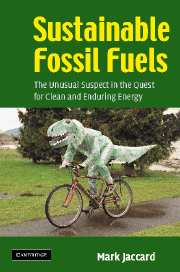Book contents
- Frontmatter
- Contents
- List of figures
- List of tables
- Preface
- Acknowledgments
- 1 What is energy sustainability?
- 2 Is our current energy path sustainable?
- 3 The prospects for clean secondary energy
- 4 The usual suspects: efficiency, nuclear and renewables
- 5 The unusual suspect: how long can fossil fuels last – and does it matter?
- 6 Can we use fossil fuels cleanly – and what might it cost?
- 7 Sustainable energy choices: comparing the options
- 8 Sustainable energy policy: how do we get there?
- 9 Broadening the definition: is sustainable energy sustainable?
- Bibliography
- Appendix ‒ synopsis and chapter reading guide
- Index
6 - Can we use fossil fuels cleanly – and what might it cost?
Published online by Cambridge University Press: 06 July 2010
- Frontmatter
- Contents
- List of figures
- List of tables
- Preface
- Acknowledgments
- 1 What is energy sustainability?
- 2 Is our current energy path sustainable?
- 3 The prospects for clean secondary energy
- 4 The usual suspects: efficiency, nuclear and renewables
- 5 The unusual suspect: how long can fossil fuels last – and does it matter?
- 6 Can we use fossil fuels cleanly – and what might it cost?
- 7 Sustainable energy choices: comparing the options
- 8 Sustainable energy policy: how do we get there?
- 9 Broadening the definition: is sustainable energy sustainable?
- Bibliography
- Appendix ‒ synopsis and chapter reading guide
- Index
Summary
The planet appears to have sufficient fossil fuel resources for these to play a significant role in the global energy system far beyond this century, and to enable a smooth transition to alternatives as needed. As fossil fuel use continues, however, the associated environmental threats – degradation of soil and water, alienation of land, smog, acid rain, and climate change – may intensify to the point where cleanliness concerns far outweigh endurance concerns. Many argue that this is already the case. But is it inevitable that fossil fuel use harms humans and their environment? What have we done in the past to mitigate the negative consequences of fossil fuel use? How cleanly could we use fossil fuels in future if we made a sincere effort?
Environmental and human impacts from fossil fuel use
While the high energy density of fossil fuels has been exploited with increasing effectiveness first in the steam engine, and then in the steam turbine and internal combustion engine, the harm from fossil fuels is manifest in air, water and land, ranging in scope from local to global. These effects are associated with all stages in the fossil fuel chain, from exploration and extraction to processing, transport and final use. Humans have tried to reduce the impacts from fossil fuel use, and have met with some successes, although these incremental improvements are under continuous pressure from the relentless growth in total consumption.
- Type
- Chapter
- Information
- Sustainable Fossil FuelsThe Unusual Suspect in the Quest for Clean and Enduring Energy, pp. 168 - 207Publisher: Cambridge University PressPrint publication year: 2006



